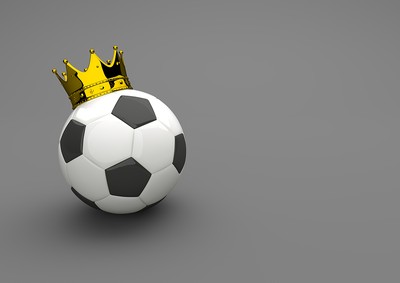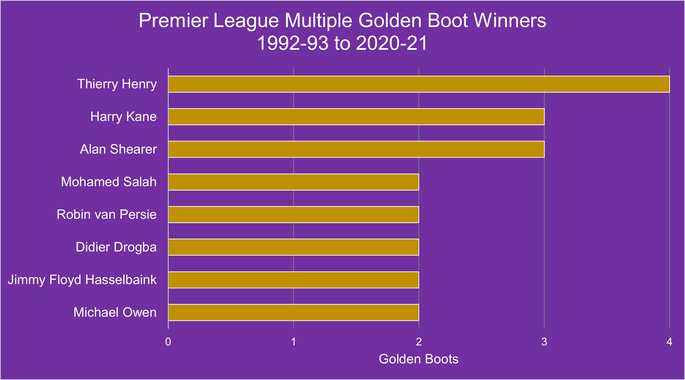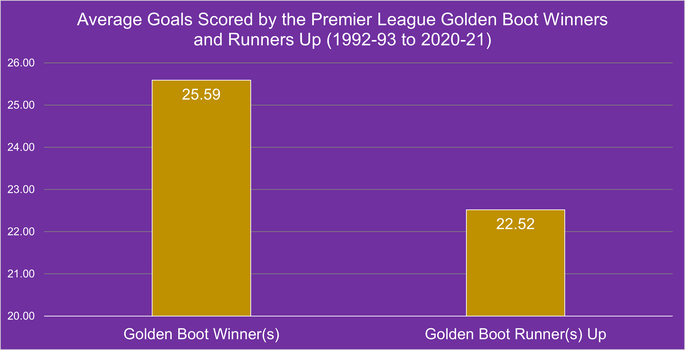 When a Premier League season gets underway, the most immediate thought of all concerned is about which team will win it, which sides will finish in the European places and which clubs will be relegated down to the Championship. What a lot of people might not think about is the numerous different mini-battles taking place around the division, such as which goalkeeper will end up with the Golden Gloves and which forward will win the Golden Boot. Both are important to the overall league winners whilst also being individual accolades.
When a Premier League season gets underway, the most immediate thought of all concerned is about which team will win it, which sides will finish in the European places and which clubs will be relegated down to the Championship. What a lot of people might not think about is the numerous different mini-battles taking place around the division, such as which goalkeeper will end up with the Golden Gloves and which forward will win the Golden Boot. Both are important to the overall league winners whilst also being individual accolades.
Of course, it is not uncommon for the top goal scorer in the Premier League to play for a team that doesn’t win the title, such is the extent to which the title-winners need to be well-balanced all over the pitch. Equally, there have been a few occasions on which a player has scored enough goals to have won the Golden Boot in many other league seasons but didn’t that year because of the competitiveness of the competition. There have even been campaigns in which the Golden Boot has been shared between several players, as we’ll discover.
How Many Goals Are Needed to Win the Premier League Golden Boot?
Between the first Premier League season in 1992-93 and the 2020-21 season, the Premier League Golden Boot winner scored an average of 26 goals if rounded up to the nearest goal.
The average number of goals scored by the second highest scorer(s) was 23, if rounded up to the nearest full goal. This means the benchmark number of goals required to win a Premier League golden boot is 24 goals.
The Golden Boot Winners Over The Years

First things first, let’s have a look at the Golden Boot winners over the years that the competition has been in play. It was introduced in 1992/1993, at the end of the inaugural season of the Premier League, which was founded when the top clubs from the First Division split away from the rest of the English Football League. The award itself has had numerous different titles over the years, largely thanks to sponsors of the top-flight. Players initially had 42 games to score goals in, until the league moved to having 20 teams instead of 22 in 1995.
Here’s a look at the Golden Boot winners, the team that they played for at the time that they won it and whether or not they managed to fire their side to the Premier League title:
Premier League Golden Boot Winners – 1993 to 2021
| Season | Winner | Goals | Team | Title Winner? |
|---|---|---|---|---|
| 2020-2021 | Harry Kane | 23 | Tottenham Hotspur | ✖ |
| 2019-2020 | Jamie Vardy | 23 | Leicester City | ✖ |
| 2018-2019 | Pierre-Emerick Aubameyang | 22 | Arsenal | ✖ |
| Sadio Mané | 22 | Liverpool | ✖ | |
| Mohamed Salah | 22 | Liverpool | ✖ | |
| 2017-2018 | Mohamed Salah | 32 | Liverpool | ✖ |
| 2016-2017 | Harry Kane | 29 | Tottenham Hotspur | ✖ |
| 2015-2016 | Harry Kane | 25 | Tottenham Hotspur | ✖ |
| 2014-2015 | Sergio Agüero | 26 | Manchester City | ✖ |
| 2013-2014 | Luis Suarez | 31 | Liverpool | ✖ |
| 2012-2013 | Robin van Persie | 26 | Manchester United | ✅ |
| 2011-2012 | Robin van Persie | 30 | Arsenal | ✖ |
| 2010-2011 | Carlos Tevez | 20 | Manchester City | ✖ |
| Dimitar Berbatov | 20 | Manchester United | ✅ | |
| 2009-2010 | Didier Drogba | 29 | Chelsea | ✅ |
| 2008-2009 | Nicolas Anelka | 19 | Chelsea | ✖ |
| 2007-2008 | Cristiano Ronaldo | 31 | Manchester United | ✅ |
| 2006-2007 | Didier Drogba | 20 | Chelsea | ✖ |
| 2005-2006 | Thierry Henry | 27 | Arsenal | ✖ |
| 2004-2005 | Thierry Henry | 25 | Arsenal | ✖ |
| 2003-2004 | Thierry Henry | 30 | Arsenal | ✅ |
| 2002-2003 | Ruud van Nistelroy | 25 | Manchester United | ✅ |
| 2001-2002 | Thierry Henry | 24 | Arsenal | ✅ |
| 2000-2001 | Jimmy Floyd Hasselbank | 23 | Chelsea | ✖ |
| 1999-2000 | Kevin Phillips | 30 | Sunderland | ✖ |
| 1998-1999 | Dwight Yorke | 18 | Manchester United | ✅ |
| Jimmy Floyd Hasselbank | 18 | Leeds United | ✖ | |
| Michael Owen | 18 | Liverpool | ✖ | |
| 1997-1998 | Chris Sutton | 18 | Blackburn Rovers | ✖ |
| Dion Dublin | 18 | Coventry City | ✖ | |
| Michael Owen | 18 | Liverpool | ✖ | |
| 1996-1997 | Alan Shearer | 25 | Newcastle United | ✖ |
| 1995-1996 | Alan Shearer | 31 | Blackburn Rovers | ✖ |
| 1994-1995 | Alan Shearer | 34 | Blackburn Rovers | ✅ |
| 1993-1994 | Andy Cole | 34 | Newcastle United | ✖ |
| 1992-1993 | Teddy Sheringham | 22 | Tottenham Hotspur | ✖ |
There are a number of interesting things that stand out from that table, with the most obvious being the number of times that the Golden Boot winner did not play for the title-winning team that season. Indeed, out of the 29 seasons that we’ve been able to look at, the Golden Boot went on to be part of the title-winning celebrations just 9 times, with two of those being occasions on which the honour was shared between two or more players, so the Golden Boot winner wasn’t even exclusive that year.
The other point that stands out is how rare it is for a player to have won the honour on more than one occasion. It is common to assume that goalscorers will score goals regularly because that is what they are good at, yet only eight players have won the award more than once out of the 24 players that have taken home the Golden Boot at the end of a Premier League season. At the time of writing, Thierry Henry holds the record for Golden Boot wins, having claimed it on four occasions during his Arsenal career.

The last thing worth mentioning is the vast difference between the number of goals scored by the winners of the title. From Andy Cole’s 34 in 40 games, at a rate of 0.85 goals per game, through to the six times that 18 goals has been enough, with that happening twice for Michael Owen, it is fair to say that how many goals you’ll need to score to win the Golden Boot is a moveable feast. Owen scored his first 18 in 36 games for a rate of 0.50 goals per game and his second 18 in 30 games for a rate of 0.60 goals per game.
The Players That Came Close But Missed Out
There have been a number of times over the years when a player has scored enough goals to have won the Golden Boot in another season but missed out because of someone else scoring more. Indeed, it has happened in every season apart from the ones in which the Golden Boot winner scored 18 goals. Here’s a look at the players that missed out and finished in second place:
Premier League Golden Boot Runners-Up – 1993 to 2021
| Season | Player | Goals (Winner) | Team | Title Winners? |
|---|---|---|---|---|
| 2020-2021 | Mohamed Salah | 22 (23) | Liverpool | ✖ |
| 2019-2020 | Danny Ings | 22 (23) | Southampton | ✖ |
| P-E Aubameyang | 22 (23) | Arsenal | ✖ | |
| 2018-2019 | Sergio Agüero | 21 (22) | Manchester City | ✅ |
| 2017-2018 | Harry Kane | 30 (32) | Tottenham Hotspur | ✖ |
| 2016-2017 | Romelu Lukaku | 25 (29) | Everton | ✖ |
| 2015-2016 | Jamie Vardy | 24 (25) | Leicester City | ✅ |
| Sergio Agüero | 24 (25) | Manchester City | ✖ | |
| 2014-2015 | Harry Kane | 21 (26) | Tottenham Hotspur | ✖ |
| 2013-2014 | Daniel Sturridge | 21 (31) | Liverpool | ✖ |
| 2012-2013 | Luis Suarez | 23 (26) | Liverpool | ✖ |
| 2011-2012 | Wayne Rooney | 27 (30) | Manchester United | ✖ |
| 2010-2011 | Robin van Persie | 18 (20) | Arsenal | ✖ |
| 2009-2010 | Wayne Rooney | 26 (29) | Manchester United | ✖ |
| 2008-2009 | Cristiano Ronaldo | 18 (19) | Manchester United | ✅ |
| 2007-2008 | Emmanuel Adebayor | 24 (31) | Arsenal | ✖ |
| Fernando Torres | 24 (31) | Liverpool | ✖ | |
| 2006-2007 | Benni McCarthy | 18 (20) | Blackburn Rovers | ✖ |
| 2005-2006 | Ruud van Nistelrooy | 21 (27) | Manchester United | ✖ |
| 2004-2005 | Andy Johnson | 21 (25) | Crystal Palace | ✖ |
| 2003-2004 | Alan Shearer | 22 (30) | Newcastle United | ✖ |
| 2002-2003 | Thierry Henry | 24 (25) | Arsenal | ✖ |
| 2001-2002 | Alan Shearer | 23 (24) | Newcastle United | ✖ |
| Jimmy Floyd Hasselbank | 23 (24) | Chelsea | ✖ | |
| Ruud van Nistelrooy | 23 (24) | Manchester United | ✖ | |
| 2000-2001 | Marcus Stewart | 19 (23) | Ipswich Town | ✖ |
| 1999-2000 | Alan Shearer | 23 (30) | Newcastle United | ✖ |
| 1998-1999 | Andy Cole | 17 (18) | Manchester United | ✅ |
| Nicolas Anelka | 17 (18) | Arsenal | ✖ | |
| 1997-1998 | Dennis Bergkamp | 16 (18) | Arsenal | ✅ |
| Jimmy Floyd Hasselbaink | 16 (18) | Leeds United | ✖ | |
| Kevin Gallacher | 16 (18) | Blackburn Rovers | ✖ | |
| 1996-1997 | Ian Wright | 23 (25) | Arsenal | ✖ |
| 1995-1996 | Robbie Fowler | 28 (31) | Liverpool | ✖ |
| 1994-1995 | Robbie Fowler | 25 (34) | Blackburn Rovers | ✖ |
| 1993-1994 | Alan Shearer | 31 (34) | Blackburn Rovers | ✖ |
| 1992-1993 | Les Ferdinand | 20 (22) | QPR | ✖ |
One of the first things that you notice when you look at the table is just how prolific Alan Shearer was during his career. Not only did he win the Golden Boot three times, he also narrowly missed out on four further occasions. He was one of the Premier League’s greatest ever forwards, he retired as the Premier League’s record goalscorer, having found the net 260 times in 441 appearances. The other thing that stands out is how rarely the Premier League winners boasted even the second-highest goalscorer.
Perhaps nothing points out just how much Premier League football is a team game, in which balance all over the pitch is the most important thing, quite like the eventual title-winners boasting either the Golden Boot winner or the closest runner-up 14 times in total out of the 29 seasons that there have been. That is nine Golden Boot winners and five second-placed players for the Premier League winners, in terms of the breakdown.
So How Many Goals Need To Be Scored To Win The Golden Boot?
![]() As you can tell, the actual specific amount of goals that need to be scored by a player hoping to win the Golden Boot is a moveable feast. It is fair to say that you’re probably talking mid-20s for most seasons, given that at least 20 goals were scored by the runners-up in 23 of the 29 campaigns that we’ve looked at.
As you can tell, the actual specific amount of goals that need to be scored by a player hoping to win the Golden Boot is a moveable feast. It is fair to say that you’re probably talking mid-20s for most seasons, given that at least 20 goals were scored by the runners-up in 23 of the 29 campaigns that we’ve looked at.
If we take only the goals scored by one of the players when the Golden Boot was shared out between numerous footballers, that means that there were 684 goals scored by the Golden Boot winners since the Premier League began. That works out as an average of 23.59 goals scored by the winning player each season.
That average fits in with our general sense that you need to find the back of the net more than 20 times if you’re hoping to win the Golden Boot. As mentioned, this isn’t an exact science, but it does give us a good idea of the number of goals needed.

One final thing worth mentioning is the fact that the Golden Boot in the Premier League is different from similar awards in other competitions in terms of betting. In the World Cup, for example, the Golden Boot goes to the player who scored the most goals and if there is a tie then the player with the fewest penalties wins. After that, it is about the player with the most assists. A bet on that will have a definitive winner, whereas a bet on the Premier League’s Golden Boot winner might still result in a dead-heat.
